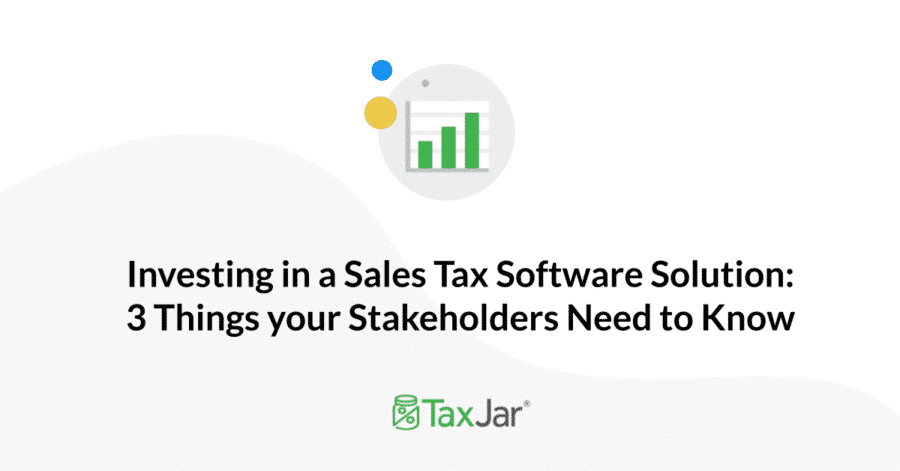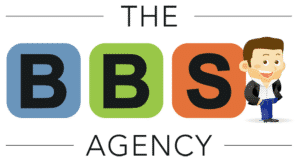3 Things You Need to Know Before Investing in a Sales Tax Software Solution


By Vincent Wondra
January 2, 2022
Whether you’re a sales tax expert or a beginner, having a sales tax software solution saves time and money all while reducing risk.
If you’re manually reporting and filing sales tax, you understand the hassle that goes into being compliant. Between inconsistent state regulations, changing laws, and filing frequency changes, the manual hours quickly add up. For example, the average tax return in the state of Colorado is 100+ pages long and that’s just one state.
That said, there are solutions to make sales tax compliance easier. Sales tax compliance tools take the sales tax burdens off growing ecommerce companies. But like any new cost, it can be difficult to convince stakeholders it’s worth the investment. We’re to help!
Let’s start by outlining the pros of having a sales tax compliance software in place. Here are a few ways having a sales tax solution like TaxJar can help keep businesses focused on growth, rather than spending hours manually calculating and filing sales tax returns.
1. Less risk for your business
Today, there are thousands of product tax codes used to determine product taxability, and there over 14,000 sales tax jurisdictions in the U.S., each carrying its own set of rules around what to tax and how much. Staying up to date with rate changes across all jurisdictions is difficult especially for retailers who sell products across state lines. And the rates are important! If you underpay, you could face hefty fines or other legal ramifications. Conversely, if you charge customers too much sales tax, you may lose them or potentially face bad reviews and poor customer satisfaction rates. If you should’ve been paying sales tax but haven’t, the state may force you to pay arrears in the form of back taxes. These could be hefty, and can be detrimental to a growing business.
What’s the cost of not paying sales tax on time or at all? Common late fees and penalties are on average 10% of what you owe. That’s a direct impact to your bottom line on a function that is not generating revenue.
Even more, businesses who owe back sales taxes are often unattractive to someone who may want to purchase the business, who could be held liable for unpaid taxes incurred prior to ownership. If you’re looking to attract investors or buyers, your back office needs to be organized and sales tax compliant.
2. Save time with automation
Automating the repetitive and tedious tasks related to sales tax takes you away from high value, revenue generating activities necessary for a thriving business. The pass-through activity of sales tax management is a great example of this. It doesn’t benefit your growth or bottom line, but it is a time-sensitive requirement that carries ongoing risk. Automation saves you time and resources, high-level of compliance for your business.
In a perfect world, tax management would reside in the background as something you don’t have to think about. But every customer transaction requires a sales tax calculation decision. This decision is complex. Sales tax responsibilities can be impacted by your customer, the product or service being purchased, where the product is shipping from and to, the dollar amount of the purchase and all of the state rates and rules that change frequently. Once you’ve collected sales tax, you still need to report, file and pay the states according to your filing calendar.
Partnering with a provider that handles calculation, reporting, filing and nexus tracking solves a variety of operational challenges which ultimately eases the pain of sales tax management . On average, the typical ecommerce seller saves five hours per state on filing sales tax with a sales tax automation tool. That’s time that can be put into tasks that actually grow the business.
3. Sales tax experts to keep track of changing laws and regulations
Each state has their own rules and regulations when it comes to sales tax. And these change frequently. Filing frequencies, nexus requirements, and product tax classifications are often being updated. Instead of keeping up with those changes yourself, your sales tax compliance experts can handle that for you, and notify you when there are changes that impact your business.
Sales tax is a complicated concept, especially if you aren’t familiar with the terminology and tax jargon. Just like other functions in your business, you should rely on the experts to help you make the right decisions to protect your business and growth.
Next Up, Evaluate
Once you get your stakeholders on board, you’ll need to evaluate different sales tax software tools to find the right fit for your business. TaxJar can also help there with our free guide to evaluating a sales tax software solution. We’ll walk through the most important features you should look for in a sales tax software, and the types of questions you should ask when you speak to a representative. Download the free guide here.
Please note: This blog is for informational purposes only. Be advised that sales tax rules and laws are subject to change at any time. For specific sales tax advice regarding your business, contact a sales tax expert.
